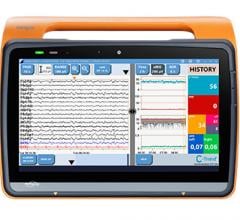
February 17, 2015 — Thanks to a two-minute newborn screening test designed to help detect heart defects, a Michigan couple was made aware of their newborn daughter’s unexpected heart defect. The test is now a requirement in hospitals throughout Michigan.
At birth, Payton was the image of perfect health. But just minutes before parents Holly and Rob Morris of Quincy, Mich., expected to take her home from Hillsdale Community Health Center, they learned Payton had failed a newborn screening test designed to help detect heart defects.
The couple was shocked. There were no signs of trouble throughout the pregnancy that included regular prenatal care and recommended screenings.
The test showed that Payton had abnormally low oxygen levels. Hillsdale pediatrician Hugh Brainard, M.D., and his team acted quickly to get Payton transferred to University of Michigan’s C.S. Mott Children's Hospital where she was officially diagnosed with a critical congenital heart defect that is among the most difficult to detect before birth.
As the state recognizes Michigan Congenital Heart Defect Awareness week in February and the 50th anniversary of Michigan’s Newborn Screening Program this year, Payton’s case highlights the importance of the state’s new screening requirement for all Michigan birthing centers to screen for heart defects using pulse oximetry at 24 hours of life. The mandate took effect in April 2014 and the Michigan Department of Community Health, collaborating with U-M and others, created the tools needed for birthing centers and midwives to implement the screening.
“Payton’s diagnosis was a direct result of the newborn screening program,” says Ronald Grifka, M.D., pediatric cardiologist at U-M’s C.S. Mott Children’s Hospital.
"Her case underlines why this screening program became mandatory – so that we can detect significant heart defects that may not cause any symptoms before a newborn is discharged from the hospital. This early detection screening prevents babies from leaving the hospital with their parents assuming all is well, then becoming critically ill at home.
“We are pleased that our Michigan Congenital Heart Center team was able to diagnose Payton’s heart problem and promptly get her the care she needed.”
U-M’s C.S. Mott Children’s Hospital has routinely offered the newborn screening since 2003. While this screening cannot detect all heart defects, it ensures that more babies can receive immediate care if the pulse oximetry test shows that their oxygen levels are not normal.
Payton was diagnosed with total anomalous pulmonary venous return (TAPVR), which means that oxygen-rich blood does not return from the lungs to the left atrium like it’s supposed to. This is one of several specific critical heart defects that may be detected by newborn screening since it is not always possible to diagnose these defects before birth.
For more information: www.mottchildren.org


 October 21, 2025
October 21, 2025 









